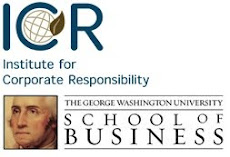Friday, March 25, 2011
New CRM Blog
Saturday, March 5, 2011
Environmental Film Festival coming up (March 15-27)
http://www.dcenvironmentalfilmfest.org/
Tuesday, February 1, 2011
10 February Business Response to Climate Change
The goal of the conference is to inspire the business leaders of tomorrow to think about ways that they can drive tomorrow's energy strategies, and use the power of business to create lasting social and environmental good.
Students can register for the conference at a discount rate.
http://thebusinessreponse.com
Friday, January 7, 2011
The Other Climate Conference
Driving down Mexico highway 307 en route to the beach over holiday break, I was surprised to learn that the gated, sprawling structure we passed on our right was the site of the Cancun Climate Change Conference, which took place just weeks before in early December.
Glimpsing it brought me back to the morning I cracked open the Economist and read the headline summarizing it: A Sort of Progress. After the disappointment that followed the much-hyped 2009 Copenhagen Summit, it was encouraging to read something suggestive of progress.
The 194 countries in attendance agreed:
· By 2020, to provide $100 billion a year for developing countries as climate assistance.
· To establish a Climate Fund to channel that would channel money through the World Bank.
· To develop a system whereby countries receive rewards for lowering rates of deforestation.
While a step in the right direction in terms of process and international cooperation, several countries, Bolivia foremost among them, opposed the eventual agreement on the grounds that it would do little to slow down global climate change. America, China, and other big polluters are no closer to subjecting themselves to binding emissions targets, nor will they be any time soon. In a controversial move, Japan used the occasion of Cancun to make clear that it will not make a renewed commitment to emissions cuts once the Kyoto Protocol expires in 2012.
It is interesting to follow these events as a business school student. The Cancun negotiations took place on the highest of macro universes, seemingly far removed from the level of the firm. At the same time, any progress or lack thereof on a global scale is bound to affect business, and my career.
My beliefs are such that I view the work of the government and extra-national organizations as crucial insofar as they create the conditions for business to function, and operate on the level needed to address global issues.
That being said, the business student and economics major in me is banking on the private sector to get the job done. If you have the chance, definitely read Steven’s Levitt’s new book, Super Freakonomics. True to his billing, Levitt provides an interesting take on climate change and profiles in a very interesting and accessible manner, some of the wacky private-sector innovations that could save the world!
John Dillman Global MBA, 2012




